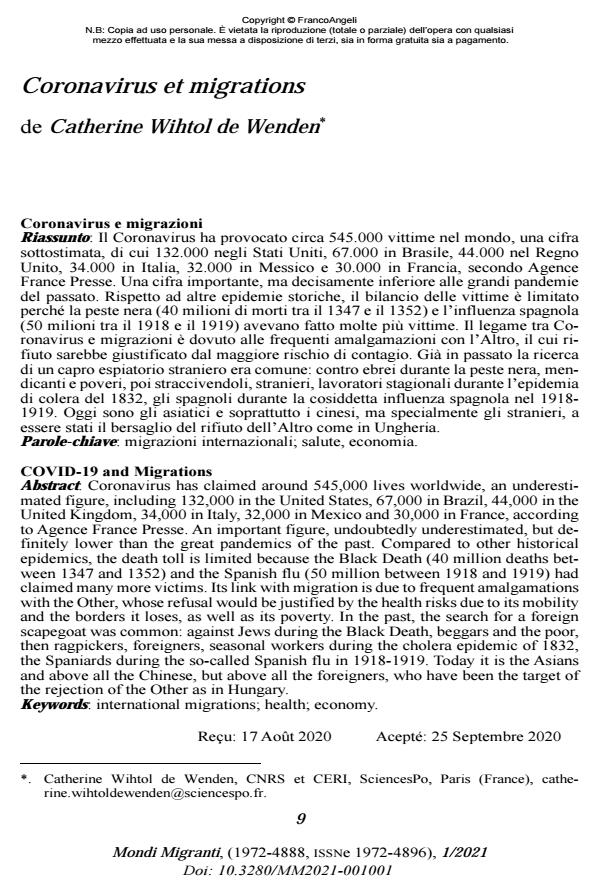COVID-19 and Migrations
Journal title MONDI MIGRANTI
Author/s Catherine Wihtol de Wenden
Publishing Year 2021 Issue 2021/1
Language French Pages 8 P. 9-16 File size 189 KB
DOI 10.3280/MM2021-001001
DOI is like a bar code for intellectual property: to have more infomation
click here
Below, you can see the article first page
If you want to buy this article in PDF format, you can do it, following the instructions to buy download credits

FrancoAngeli is member of Publishers International Linking Association, Inc (PILA), a not-for-profit association which run the CrossRef service enabling links to and from online scholarly content.
Coronavirus has claimed around 545,000 lives worldwide, an underestimated fi-gure, including 132,000 in the United States, 67,000 in Brazil, 44,000 in the Uni-ted Kingdom, 34,000 in Italy, 32,000 in Mexico and 30,000 in France, according to Agence France Presse. An important figure, undoubtedly underestimated, but definitely lower than the great pandemics of the past. Compared to other historical epidemics, the death toll is limited because the Black Death (40 million deaths between 1347 and 1352) and the Spanish flu (50 million between 1918 and 1919) had claimed many more victims. Its link with migration is due to frequent amal-gamations with the Other, whose refusal would be justified by the health risks due to its mobility and the borders it loses, as well as its poverty. In the past, the search for a foreign scapegoat was common: against Jews during the Black Death, beg-gars and the poor, then ragpickers, foreigners, seasonal workers during the cholera epidemic of 1832, the Spaniards during the so-called Spanish flu in 1918-1919. Today it is the Asians and above all the Chinese, but above all the foreigners, who have been the target of the rejection of the Other as in Hungary.
Il Coronavirus ha provocato circa 545.000 vittime nel mondo, una cifra sottosti-mata, di cui 132.000 negli Stati Uniti, 67.000 in Brasile, 44.000 nel Regno Unito, 34.000 in Italia, 32.000 in Messico e 30.000 in Francia, secondo Agence France Presse. Una cifra importante, ma decisamente inferiore alle grandi pandemie del passato. Rispetto ad altre epidemie storiche, il bilancio delle vittime è limitato perché la peste nera (40 milioni di morti tra il 1347 e il 1352) e l’influenza spa-gnola (50 milioni tra il 1918 e il 1919) avevano fatto molte più vittime. Il legame tra Coronavirus e migrazioni è dovuto alle frequenti amalgamazioni con l’Altro, il cui rifiuto sarebbe giustificato dal maggiore rischio di contagio. Già in passato la ricerca di un capro espiatorio straniero era comune: contro ebrei durante la peste nera, mendicanti e poveri, poi straccivendoli, stranieri, lavoratori stagionali duran-te l’epidemia di colera del 1832, gli spagnoli durante la cosiddetta influenza spa-gnola nel 1918-1919. Oggi sono gli asiatici e soprattutto i cinesi, ma specialmente gli stranieri, a essere stati il bersaglio del rifiuto dell’Altro come in Ungheria.
Keywords: International migrations; health; economy.
- Gli atteggiamenti nei confronti dell'immigrazione prima e dopo la pandemia Covid-19 in 13 paesi europei. Uno studio esplicativo Veronica Riniolo, Vera Lomazzi, in MONDI MIGRANTI 1/2025 pp.189
DOI: 10.3280/MM2025-001010 - Quarantine Ships as Spaces of Bordering: The Securitization of Migration Policy in Italy During the COVID-19 Pandemic Nicola Montagna, in International Migration Review /2024 pp.499
DOI: 10.1177/01979183231154560
Catherine Wihtol de Wenden, Coronavirus et migrations in "MONDI MIGRANTI" 1/2021, pp 9-16, DOI: 10.3280/MM2021-001001